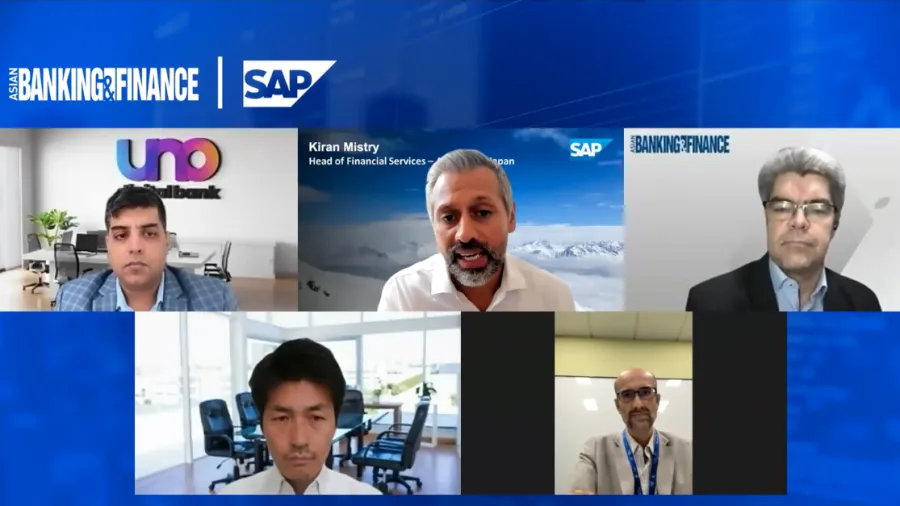
Striking the Balance: Risk Management and Profitability in Banking
Industry experts convened to explore the intricate relationship between banks, risk, resilience, and technology in emerging markets.
The dynamic landscape of banking has evolved exponentially, driven by technological advancements, global economic shifts, and regulatory changes. In this ever-changing environment, emerging markets have emerged as both a promising frontier and a realm fraught with challenges. Banks operating in these markets must strike a delicate balance between risk management and revenue generation to thrive and survive.
To shed light on these pressing concerns, a panel of seasoned experts recently gathered for a fireside chat titled "Banking in a Volatile Economy - Building Resilient Foundations, Navigating Risks, and setting up for growth." This insightful discussion by Asian Banking & Finance Magazine, in collaboration with SAP, offered a comprehensive exploration of the challenges and opportunities that banks face in this evolving landscape.
The event was moderated by Simon Hyett, Contributing Editor of Asian Banking and Finance Magazine, whilst the panellists were Kiran Mistry, Head of Financial Services at SAP; Gaurav Bagga, Cluster Chief Financial Officer, Singapore and ASEAN Markets at Standard Chartered Bank; Kohei Ueda, Head of Digital Transformation and Global Transaction Banking Department at Mizuho Bank; and Rajeev Gupta, Chief Financial Officer at UNOasia Private Limited.
Several key insights emerged during the discussion, shedding light on the nuanced relationship between risk management, revenue generation, and technological innovation in emerging markets.
Building Resilient Foundations to Mitigate Risks, Promote Growth
The fireside chat opened with a discussion on various aspects of how banks can leverage technology, data, and other tools to assess and mitigate credit risk, manage liquidity risk, and enhance operational efficiency.
Mistry distinguished between digital banks and traditional banks, highlighting the historical complexities faced by the latter. He likewise underscored the pivotal role of technology in all industries, including banking, emphasising the need to establish a comprehensive data fabric that optimises organisational-wide data usage.
Whilst Mistry emphasised the importance of generative AI, Kohei-san discussed the significance of AI in enhancing operational efficiency and suggested exploring generative AI's potential applications. He also emphasised the challenge of legacy systems and the need to increase the number of bank employees who comprehend and support technological advancements.
Adding on, Bagga highlighted the importance of applying both large- and small-scale automation to further improve processes. He also shared how having a sandbox to explore new technology stacks can create new opportunities for the industry, and how dedicating small clusters of relevant tech talent to each business can positively impact processes and outcomes.
Overall, the panellists collectively shed light on the multifaceted strategies and considerations essential for banking institutions to thrive amidst economic turbulence and evolving technological landscapes, with an eye on both efficiency and adaptability.
Establishing a Clear Risk Appetite
Several more key insights emerged during the discussion, shedding light on the nuanced relationship between risk management, revenue generation, and technological innovation in emerging markets.
Gupta stressed that a lack of clear risk management is the primary reason for bank failures. Given this, banks must establish a defined risk appetite, enabling them to navigate the complexities of risk whilst maintaining profitability. This emphasis on clarity in risk management was a recurrent theme throughout the discussion.
“Risk culture, tolerance, and threshold levels need to be embedded across the organisation, along with scenario modelling and simulation. I think they're critical to ensuring success for an organisation, and balancing risk,” added Mistry.
Meanwhile, Bagga emphasised the importance of proactive risk management, underlining the need to execute a well-prepared playbook swiftly when crises strike. This means creating robust risk management frameworks that anticipate challenges and have mitigation strategies ready. Bagga shared, “The entire stress testing piece is extremely important—this is where the availability of data in an organisation and the ability to find agile ways to model outcomes come into play. And with time, this will only get more sophisticated.”
Gupta seconded these insights as he underscored that with banks’ exposure to changing economic conditions, they have to ensure that they are ready for any capital situation instead of waiting for such instances to happen. “You need to make sure that you just don't operate above your minimum capital; you also have a sufficient buffer for those kinds of situations to happen. Then, having a diversified portfolio of the business is very, very important because having overreliance on a certain sector [of the] economy could be impactful,” Gupta said.
To close the fireside chat, each panellist highlighted various perspectives on building resilience. Kohei-san provided a technological perspective, emphasising the role of data in maintaining resilience. He highlighted the importance of understanding the complete picture, from customer needs to market trends. This comprehensive understanding of data is crucial for meeting the evolving demands of the banking industry.
For Bagga, having the right mindset around creating a robust risk management strategy is critical, in addition to having the right talent in place that can support and understand the Bank’s financial instruments and customers.
Gupta, on the other hand, reiterated the importance of being able to adapt to changing market conditions. He noted that whilst banks can continue to follow conservative capital management, risk management frameworks, or liquidity solutions in place, they must equally focus on building a digital architecture that allows them to be nimble, data-driven, and customer-centric to adapt to these changes.
Meanwhile, Mistry's insights stressed the vital role of data and technology modernisation. He encouraged banks to embrace technology to unlock opportunities for better risk management and customer-centric approaches. Referencing Peter Drucker’s quote, “The greatest danger in times of turbulence is not the turbulence – it’s to act with yesterday’s logic” translating it to It's not today's challenges that are the issue; it's the fact that we're using yesterday's technology to address today's challenges,” he explained.
The fireside chat offered invaluable insights into the intricate balance between risk management and revenue generation in emerging markets. The panellists collectively noted the need for a clear risk appetite, proactive risk management, data optimisation, and technology modernisation. These strategies are indispensable for navigating the volatile landscape of banking in emerging markets.
Embracing the latest technology and data-driven strategies will be key to steering the course and thriving in these complex waters. Banks must stay ahead of the curve, challenge themselves, and leverage technology to provide better services and navigate the intricate landscape of emerging markets.
Watch the video here to see the full discussion. To gain valuable insights into building resilient foundations and navigating risks in banking, click here.

















 Advertise
Advertise












